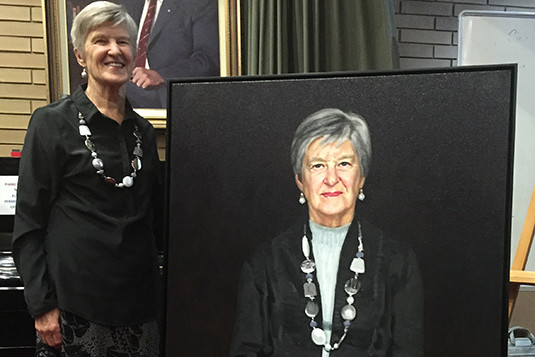- CHS 1954 – 1959
- Dux of the school: attained First Class Honours in Pure Maths; Calculus & Applied Maths; Physics and Chemistry in Year 12
- Awarded a Senior Scholarship, a Commonwealth Scholarship and a place as Minor Resident Scholarship at Melbourne University Women’s College.
- International authority on infectious diseases
- Received an Officer of the Order of Australia (AO) for distinguished service to medical research, particularly the study of infectious disease prevention and control, to tertiary education as an academic, and to public health policy.
Lyn was an exemplary student at Camberwell High. In the Class of 1959 she was Dux of the school with results that demonstrated her devotion to learning. She attained First Class Honours in Pure Maths, Calculus & Applied Maths, Physics and Chemistry. These results earned her a Senior Scholarship, a Commonwealth Scholarship and a place as Minor Resident Scholarship at Melbourne University Women’s College.
In Lyn’s words:
Writing this short self-portrait was surprisingly challenging, but reminded me how much I really enjoyed high school. When I was in Grade 6, I decided I wanted to go to Camberwell High School, rather than PLC (which my parents offered, although they could ill-afford it).
I’m not sure why – perhaps I was snobbish enough to be proud to be eligible to go to the famous (and semi-selective) Camberwell High School. Of course, it was the right decision.
Early on, I realised I wouldn’t excel at sport, so I concentrated on being a swot. Years later I realised that any success wasn’t because I was as clever as I thought I was, but because I had imbibed a Presbyterian work ethic and an embarrassing need to ‘come top’. I had a few extracurricular interests though, including, being leader of the madrigal group and house pianist. Looking back, both surprise me – I had limited musical talent and not much formal teaching – but I guess I worked at it.
After the major hurdle of the Matric exams, I had to decide what to do next. According to my “Prefect Personalities” entry in the 1959 Prospice, my secret ambition was ‘to be a farmer’s wife and raise chickens’. Good grief! Although it was the 1950s, I can’t believe I said that, even then. Really, I wanted to be a doctor, but I was nearly diverted by a chance conversation with my former French teacher, who advised me to become a nurse instead, because that way I would find a better husband. Whether because of his advice or the daunting prospect of six year’s study, I applied to do nursing at the Alfred Hospital, but they knocked me back. So I accepted an alternative offer from the Melbourne University Medical School and had the satisfaction of declining the Alfred’s belated offer of a place six months later. The apparently interminable six years’ as an undergraduate, extended to many more of postgraduate study.
Lyn started training in infectious disease, at Fairfield Hospital in 1967, and later in clinical microbiology, which was more family friendly, while her three children were little. She didn’t know, at the time, but the ‘60s was a time when many clever people thought infectious diseases were more or less finished because of vaccines and antibiotics, and the future of medicine was elsewhere.
But soon, the 1968 ‘flu pandemic began a series of emerging and re-emerging infectious diseases, of which a small selection are: Ebola, 1970s; AIDS, 1980s; drug-resistant TB, malaria and ‘golden staph’, 1980-90s; and, in the last 20 years, SARS (2003), MERS (2012), another flu pandemic (2009), Zika in Brazil (2015), Ebola in West Africa (2015) and, now, COVID-19. And, throughout this time, the insidious global plague of antimicrobial resistance has been unrelenting and – not unlike climate change – there is too little professional and political will and too much vested interest to reverse it.
Lyn: It’s been an interesting time and, for me, it’s not over yet, despite an attempt to retire in 2016. Now that I am not actually employed I can, theoretically, do what I want. For the past four years that has been research into the politics and ethics of infectious diseases – until, of course, I was drawn into the thick of Australia’s COVID-19 response, which has a way to go yet.
Professor Lyn Gilbert AO is a senior researcher at the Marie Bashir Institute for Emerging Infections and Biosecurity and at Sydney Health Ethics at the University of Sydney. Until recently she was Director of the Centre for Infectious Diseases & Microbiology Laboratory Services and Director of Infection Prevention and Control for Western Sydney Local Health District at Westmead Hospital.
Addendum
https://www.dailytelegraph.com.au/newslocal/north-shore/australia-day-honour-for-a-lifes-work-in-fighting-diseases/news-story/9dfef64d850e37d8af67ea77893a4247
In 2017 Professor Gilbert was made an Officer of the Order of Australia (AO) for her distinguished service to medical research, particularly the study of infectious disease prevention and control, to tertiary education as an academic, and to public health policy. Updated 2020

